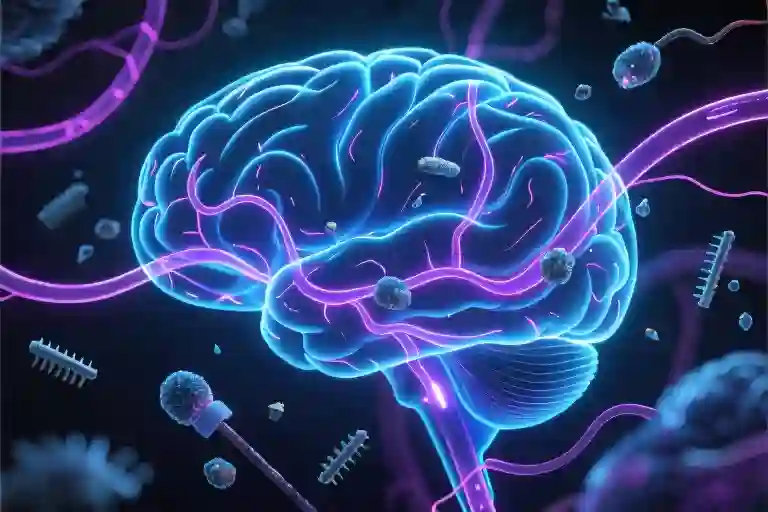You know that foggy feeling when you wake up after a short night’s sleep? Your head feels heavy, thoughts move sluggishly, and even coffee doesn’t quite cut through the mental haze. It’s as if your brain forgot to hit the ‘refresh’ button overnight. What’s actually happening might surprise you – your cranium has its own overnight cleaning crew working the night shift, and when sleep gets cut short, they don’t finish the job.
Scientists have discovered that our brains have a sophisticated waste management system called the glymphatic system – think of it as your skull’s internal janitorial staff. This biological cleaning service kicks into high gear during sleep, flushing out the day’s accumulated mental debris. The system works like microscopic plumbing, with cerebrospinal fluid washing through brain tissues to collect toxic byproducts of neural activity – the biochemical equivalent of emptying the trash and wiping down surfaces after a busy workday.
When sleep gets disrupted, this cleaning cycle gets cut short. Metabolic leftovers pile up like dirty dishes in the sink of your synapses. Research shows that proteins like beta-amyloid (associated with Alzheimer’s disease) don’t get properly cleared when the glymphatic system can’t complete its nightly rounds. It’s not just about feeling groggy tomorrow – chronic poor sleep might mean leaving these neurological ‘dishes’ unwashed for years.
The good news? Science is beginning to understand how to support this vital cleaning process. Recent studies suggest simple interventions – from sleep position adjustments to gentle lymphatic massage – might help optimize our brain’s self-cleaning abilities. It turns out that quality sleep isn’t just about rest – it’s about giving your brain the time and conditions it needs for essential housekeeping.
This discovery changes how we think about sleep. Those nighttime hours aren’t merely downtime – they’re when your brain takes out the trash, mops the floors, and prepares your mind for a new day of clear thinking. Skimp on sleep, and you’re essentially telling your neural janitors to clock out early, leaving tomorrow’s cognitive workspace cluttered and disorganized.
Understanding the glymphatic system transforms sleep from a passive state into an active maintenance process. It’s not that you’re unconscious for eight hours – your brain is working hard at something just as crucial as daytime thinking. The next time you consider burning the midnight oil, remember: you’re not just losing rest, you’re canceling your brain’s cleaning appointment.
The Toxic Burden of Sleep Deprivation
That foggy-headed feeling after a bad night’s sleep isn’t just fatigue – it’s literal brain pollution. Modern neuroscience reveals how sleep deprivation allows metabolic waste to accumulate in your neural tissue, creating cognitive consequences ranging from morning grogginess to long-term neurodegeneration.
Short-term effects hit first. Without adequate sleep, your brain’s glymphatic system – its internal waste clearance mechanism – operates at reduced capacity. Think of it like a night shift cleaning crew sent home early. Toxic byproducts like beta-amyloid proteins linger between neurons instead of being flushed away. This biological hangover manifests as:
- Impaired focus (that 3pm zoning out during meetings)
- Emotional volatility (snapping at minor irritations)
- Poor decision-making (reaching for sugary snacks instead of balanced meals)
Research from Boston University shows just one night of shortened sleep increases beta-amyloid accumulation by 5-10%. These protein fragments gradually form the plaques associated with Alzheimer’s disease. The correlation grows stronger over time – chronic poor sleep in middle age appears on brain scans decades later as accelerated gray matter shrinkage.
What makes this biological process particularly concerning is its self-reinforcing nature. As toxic debris accumulates, it impairs the very neural networks responsible for deep, restorative sleep. The brain becomes less efficient at cleaning itself, leading to more buildup – a vicious cycle moving toward cognitive decline.
Yet there’s hopeful science behind these findings. Unlike genetic risk factors, sleep quality represents a modifiable element in brain health. Understanding this connection transforms bedtime from mundane routine to preventive medicine – each good night’s sleep literally washing away the day’s neurological wear and tear.
The Glymphatic System: Your Brain’s Nighttime Janitor
Back in 2012, researchers at the University of Rochester made a discovery that changed how we understand sleep. They identified what we now call the glymphatic system – your brain’s built-in cleaning crew that works the night shift while you’re fast asleep. Think of it as a team of microscopic custodians flushing out the day’s mental clutter.
This breakthrough explained something neurologists had long suspected but couldn’t prove: how the brain, which lacks traditional lymphatic vessels, manages its waste removal. The answer came in the form of a clever biological workaround. Cerebrospinal fluid circulates through specialized channels surrounding blood vessels, washing away metabolic byproducts like beta-amyloid proteins – the same proteins that accumulate alarmingly in Alzheimer’s patients.
The process resembles a carefully choreographed dance. During deep sleep stages, brain cells actually shrink by about 60%, creating expanded interstitial spaces. This allows cerebrospinal fluid to rush through like a tidal wave, carrying away toxic debris. Meanwhile, glial cells (the brain’s support staff) act like tiny pumps, directing this cleansing flow along specific pathways. It’s nature’s perfect design – your cognition gets detailed while your body rests.
Recent imaging studies reveal this nightly maintenance cycle operates at peak efficiency during slow-wave sleep, typically in the first half of your night. That’s why those early, uninterrupted hours matter more than you might realize. When researchers compared well-rested subjects to sleep-deprived ones, they found the glymphatic system works up to ten times more effectively during proper sleep.
What’s fascinating is how this system mirrors municipal water treatment. Cerebrospinal fluid enters carrying waste, gets filtered through the brain’s tissue, then exits through specialized drainage sites near the skull base – not unlike how wastewater flows through treatment plants. The major difference? Your brain’s plumbing doesn’t get weekends off.
This discovery also explains why certain sleep positions might enhance the process. Preliminary research suggests side sleeping could optimize glymphatic flow compared to back or stomach positions. It’s as if your brain knows to tilt just right for optimal drainage – another example of the body’s quiet wisdom.
The glymphatic system’s identification didn’t just solve a scientific mystery; it gave us tangible reasons to prioritize sleep quality over mere quantity. Those extra hours in bed only help if your brain gets sufficient deep sleep to activate its full cleaning cycle. Next time you consider burning the midnight oil, remember: you’re not just losing rest – you’re canceling your brain’s most crucial maintenance appointment.
Unclogging Your Brain’s Drainage System
That foggy-headed feeling after a poor night’s sleep isn’t just fatigue—it’s literal stagnation. Your brain’s waste removal network, the glymphatic system, works like microscopic plumbing that flushes out toxic byproducts during deep sleep. When this system gets sluggish, mental cobwebs accumulate faster than a teenager’s dirty laundry pile.
Recent neuroscience studies reveal surprising ways to boost this natural cleaning process without medications or invasive procedures. One promising approach involves gentle massage techniques targeting key lymphatic drainage points. Researchers at the University of Virginia found that specific neck and skull base manipulations increased cerebrospinal fluid flow by up to 32% in trial participants—comparable to the boost from a full night’s quality sleep.
The Science Behind the Rub
Your brain’s cleaning crew works overtime during sleep, but sometimes needs daytime assistance. The glymphatic system relies on a delicate interplay between:
- Pulsating blood vessels that create hydraulic pressure
- Specialized glial cells forming waste channels
- Cerebrospinal fluid acting as biological detergent
When any component underperforms, metabolic leftovers like beta-amyloid proteins start clogging neural pathways like hair in a shower drain. This buildup correlates with decreased cognitive performance and, over time, may contribute to neurodegenerative conditions.
Three-Step Maintenance Routine
- Ear Base Activation (30 seconds per side)
Using fingertips, make small circles behind each earlobe where skull meets neck. This stimulates lymphatic vessels draining waste toward shoulder nodes. - Collarbone Reset (1 minute total)
Lightly press along clavicle indentations with flat fingers, moving outward from throat to shoulders. Enhances fluid return to circulatory system. - Scalp Hydraulics (2 minutes)
Imagine kneading bread dough as you gently lift and release sections of scalp. Improves cranial fluid exchange by mobilizing connective tissues.
Morning and evening sessions work best, especially when combined with hydration and controlled breathing. Think of it as giving your brain a manual car wash between its automatic overnight detailing.
While not replacing proper sleep, these techniques offer cognitive first aid for overworked minds. Like unkinking a garden hose, they restore flow to your neural waste management system—because nobody performs their best with backed-up brain drains.
Optimizing Sleep for Maximum Brain Detox
That groggy feeling after a poor night’s sleep isn’t just fatigue – it’s your brain literally drowning in its own metabolic waste. The glymphatic system, your brain’s self-cleaning mechanism, works hardest during deep sleep. But not all sleep is created equal when it comes to cognitive housekeeping.
Slow-wave sleep, that deliciously deep slumber in the first half of the night, acts like a power washer for your neurons. Research shows cerebral spinal fluid flow increases by 60% during these stages, flushing out toxic proteins like beta-amyloid that accumulate during waking hours. It’s nature’s perfect design: we burn mental energy by day and undergo neural maintenance by night.
Three practical adjustments can transform your bedroom into a glymphatic optimization chamber:
- Temperature tuning: Your brain cleans best at around 65°F (18°C). This slight chill mimics the natural nighttime temperature drop our ancestors experienced. Overheated rooms disrupt the thermal signaling that triggers deep sleep cycles.
- Alcohol avoidance: That nightcap sabotages more than REM sleep. Ethanol molecules interfere with aquaporin-4 channels – the microscopic portals that allow waste removal. Even moderate drinking reduces glymphatic efficiency by 30-40%.
- Schedule anchoring: Going to bed at inconsistent times confuses your suprachiasmatic nucleus (your biological clock’s CEO). This master regulator coordinates dozens of cleaning processes that follow circadian rhythms. Variability of just 90 minutes can delay waste clearance by several hours.
For those struggling with sleep maintenance, simple behavioral adjustments often outperform supplements or gadgets. The pre-sleep ‘micro-routine’ matters more than people realize: ninety minutes before bed, dim lights signal melatonin release while a warm shower leverages the body’s natural cooling response. Reading physical books (not screens) under amber lighting helps transition the brain into its nightly maintenance mode.
What makes these strategies particularly effective is their compound benefit – they simultaneously enhance slow-wave sleep duration while optimizing the chemical environment for glymphatic flow. Unlike temporary fixes like sleep aids, they work with your biology rather than against it. The results accumulate night after night, potentially reducing long-term neurodegeneration risks while providing immediate cognitive benefits.
The relationship between sleep quality and brain detoxification isn’t linear but exponential. Just as one poor night leaves you foggy, several consecutive nights of optimized sleep create a positive cascade. Cerebral spinal fluid channels become more efficient, waste removal accelerates, and you wake feeling progressively clearer. It’s the closest thing we have to a cognitive fountain of youth – and it’s available simply by aligning with your brain’s natural rhythms.
Small Changes Tonight, Big Protection Tomorrow
That foggy-headed feeling after a poor night’s sleep isn’t just fatigue—it’s literal toxic buildup in your brain. The good news? You don’t need dramatic interventions to start improving your glymphatic system function tonight. Three simple adjustments can significantly enhance your brain’s natural detox process while you sleep.
1. The Side-Sleeping Advantage
Research suggests the lateral sleeping position (on your side) may optimize cerebrospinal fluid flow compared to back or stomach sleeping. It’s not about perfection—if you wake up on your back, simply roll back to your side. Use a body pillow if needed to maintain comfort. This small shift leverages gravity to assist your brain’s waste removal system without any extra effort.
2. The 20-Minute Afternoon Reset
Short daytime naps aren’t just about energy—they give your glymphatic system a brief maintenance window. Keep it to 20 minutes maximum to avoid sleep inertia. The key is consistency: try scheduling this brief pause around the same time daily, even if you just rest quietly without sleeping. Think of it as a system reboot for your neural plumbing.
3. Light Evening Meals
That heavy dinner might be doing more than expanding your waistline. Digesting large meals diverts resources away from nighttime brain maintenance. Aim to finish eating 2-3 hours before bed, focusing on easily digestible proteins and vegetables. Notice how this simple change affects your morning mental clarity within days.
These aren’t radical lifestyle overhauls—they’re subtle tweaks that work with your body’s existing rhythms. The real risk lies in dismissing these small daily habits as insignificant. Chronic sleep disruption quietly damages your brain’s self-cleaning infrastructure, much like ignoring a slowly clogging drain. Tonight’s choices compound over years into either cognitive protection or preventable decline.
Start with just one change this evening. Your future self—with clearer thoughts and preserved memories—will thank you for this small nightly investment.





